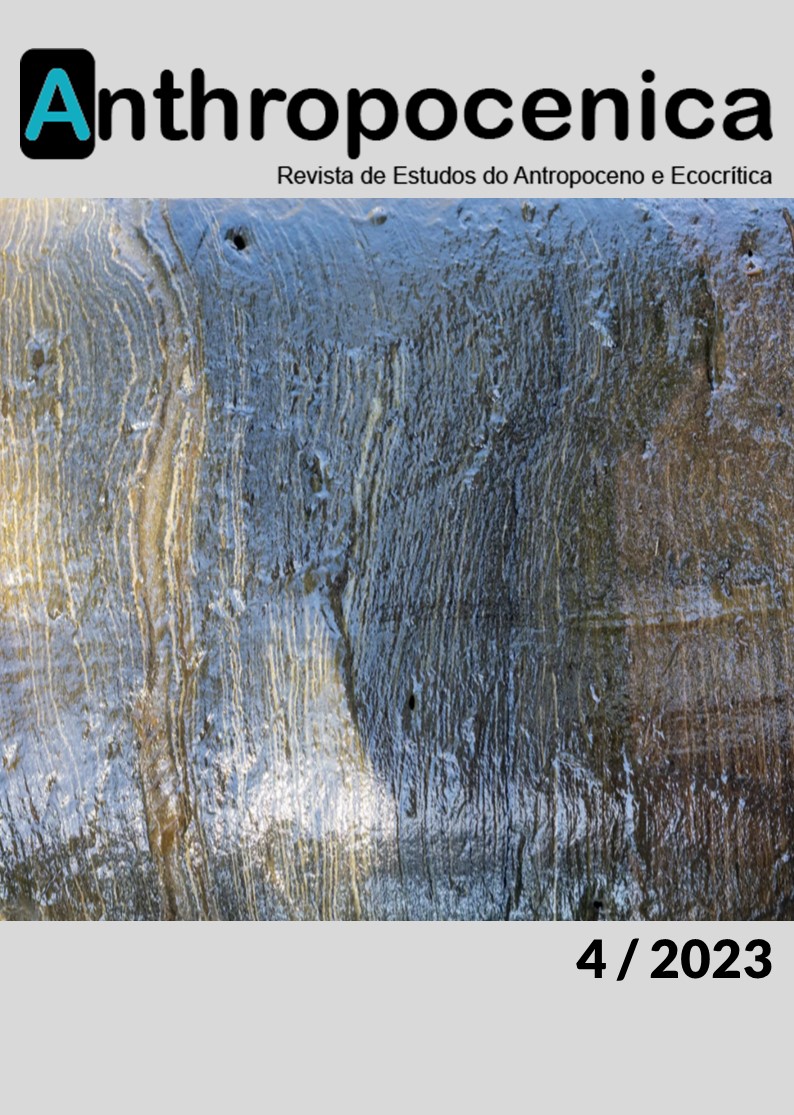A ficção climática: ponderações sobre o realismo como caminho para pensar os efeitos subjetivos do Antropoceno
DOI:
https://doi.org/10.21814/anthropocenica.4859Keywords:
Climate Fiction; Cli-fi; Anthropocene; Ecocriticism; North-American Literature.Abstract
This article discusses the trend in contemporary realistic fiction of addressing climate change, one of the most urgent issues of our time. In North-American literature, there are several works that deal with this theme, either in the backdrop or as an element that locates the narrative in the context of the Anthropocene, the possible new geological epoch marked by anthropogenic impacts on the Earth’s biophysical systems. The article explores the concept of the Anthropocene and discusses how the term has been used in the humanities to reflect on the relationship between nature and culture, on human practices of exploitation and domination over nature, and social hierarchies based on race, gender, and class. The analysis also addresses the emergence of “cli-fi,” a thematic category in contemporary fiction that deals with climate change, and how contemporary realistic fiction can explore climate change in a way that does not relegate the subject solely to science and speculative fictions. The study traces a brief historical line of environmental concerns in literature and offers three examples of how “cli-fi” can contribute to a reflection about the anthropogenic impacts on the subjective dimensions of characters and their connections with contemporary society.
Downloads
References
Bennett, J. (2010). Vibrant Matter: A Political Ecology of Thing. Duke University Press. DOI: https://doi.org/10.1215/9780822391623
Buell, L. (1995). The Environmental Imagination: Thoreau, Nature Writing, and the Formation of American Culture. Belknap Press of Harvard University Press. DOI: https://doi.org/10.4159/9780674262423
Clark, T. (2014). Nature, Post Nature. In: L. Westling (Ed.), The Cambridge Companion to Literature and the Environment (pp. 75—89). Cambridge University Press. DOI: https://doi.org/10.1017/CCO9781139342728.008
Costa, C. de L. (2014). Os estudos culturais na encruzilhada dos feminismos materiais e descoloniais. Estudos e Literatura Brasileira Contemporânea, 44: 79-103. DOI: https://doi.org/10.1590/2316-4018444
Cunha. R. (2022). Uma viagem narrativa com Thomas King. In: Tag. Índigenas de Letras, abril, 8-11.
Dwyer, J. (2010) Where the Wild Books Are: A Field Guide to Ecofiction. University of Nevada Press.
Garcés, M. (2019) Novo esclarecimento radical. Âyné.
Ghosh, A. (2022). O grande desatino: mudanças climáticas e o impensável. Trad.: Renato Prelorentzou. Quina Editora.
Glotfelty, C. & Fromm, H. (1996). The Ecocriticism Reader: Landmarks in Literary Ecology. University of Georgia Press.
Haraway, D. (2003). The Companion Species Manifesto. Prickly Paradigm Press.
Heise, U. (2006). The Hitchhiker's Guide to Ecocriticism. PMLA, 121(2): 503-516. DOI: https://doi.org/10.1632/003081206X129684
Holsinger, B. (2022). The Displacements. Riverhead Books.
Johns-Putra, A. & Goodbody, A. (2019). The Rise of the Climate Change Novel. In: A. Johns-Putra, (Ed.). Climate and Literature (pp. 229–245). Cambridge University Press. DOI: https://doi.org/10.1017/9781108505321.015
King, T. (2022). Indígenas de Férias. Tag.
King, T. (2022) Entrevista. In: Tag, abril, 25-27.
Kingsolver, B. (2012). Flight Behaviour. Faber and Faber.
Lockwood, P. (2022). No One Is Talking About This. Bloomsbury.
Offill, J. (2020). Weather. Vintage.
Opperman, S. & Iovino, S. (2017). Introduction The Environmental Humanities and the Challenges of the Anthropocene. In: Serpil Oppermann e Serenella Iovino (Eds.), Environmental Humanities: Voices from the Anthropocene. Rowman & Littlefield.
Ozeki, R. (2021). The Book of Form and Emptiness. Canongate.
Parham, J. (2021). Introduction. In: J. Parham (Ed.), The Cambridge Companion to Literature and the Anthropocene (pp. 1–33). Cambridge University Press. DOI: https://doi.org/10.1017/9781108683111.002
Purdy, J. (2015) After Nature: A Politics for the Anthropocene. Harvard University Press. DOI: https://doi.org/10.4159/9780674915671
Royal Museums of Greenwich (s.d.). Pollution in the River Thames: a history Lifeline, water source, sewer? Follow the murky story of London's relationship with the Thames. Retirado de: https://www.rmg.co.uk/stories/topics/pollution-river-thames-history
Slovic, S. (1998). Seeking Awareness in American Nature Writing. University of Utah Press.
Slovic, S. (2010). The Third Wave of Ecocriticism: North American Reflections on the Current Phase of the Discipline. Ecozon@, 1(1): 4-10. DOI: https://doi.org/10.37536/ECOZONA.2010.1.1.312
Thoreau, H. D. (2003). Walden and Civil Disobedience. Barnes & Nobles Classics.
Trexler. A. (2015). Anthropocene Fictions: The novel in a Time of Climate Change. Virginia University Press. DOI: https://doi.org/10.2307/j.ctt13x1r99
Waage, F. O. (1985). Teaching Environmental Literature. Modern Language Association of America.
Wordsworth, W. (2011). William Wordsworth: The Major Works, including The Prelude. Oxford World’s Classics.
Zalasiewicz, J., Williams, M. & Waters, C. Antropocene. (2016). In: Joni Adamson, William A. Gleason e David N. Pellow (Eds.). Keywords for Environmental Studies (pp. 14-16). New York University Press. DOI: https://doi.org/10.18574/nyu/9780814760741.003.0008




